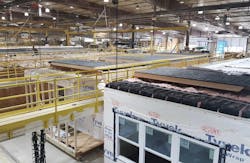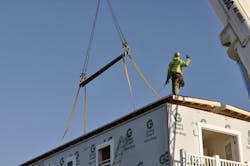Ken Semler on Franchising's Role in Helping Modular Building Grow
Ken Semler started Express Modular in 2008 and grew it into a regional builder of custom homes, small offices, and educational and assisted living facilities. Then, his company evolved into a national brand that sold modular homes on the internet in 42 states where the company is licensed and registered as a builder/contractor. Along the way, Semler (also a certified aging-in-place specialist) launched Better Living Express, a division that builds modular additions and cottages for caregivers to tend to elderly and disabled loved ones in their own homes. After being named 2019 Builder of the Year by NAHB’s Building Systems Council, Semler rebranded the company as Impresa Modular and created a franchise opportunity for developers and builders in partnership with more than 20 off-site factories.
PRO BUILDER: Why the name change?
Ken Semler: The name Express Modular was born out of the very nature of modular home building, where the construction timeline is significantly reduced. However, our goal is not just to build custom modular homes quickly, but to provide beautiful, energy-efficient, and healthy modular homes that impress. We realized that we needed a new name; a name that describes our unique position, our product, and what we have become. That new name is Impresa Modular.
PB: In what segments is modular/off-site construction gaining traction, and why?
KS: The use of modular design and construction has exploded in the hospitality industry and for use in large multifamily projects. Commercial construction is very schedule-driven and the construction of many identical modules plays well to the strengths of modular construction. Many commercial factories exist and more are coming online.
PB: Why is it basically stagnant for single-family residential?
KS: Large production builders are tied into their processes and supply chains. They are dipping their toes into the building systems pool with panelized walls, and roof and floor trusses, but they don’t understand volumetric construction, and the changes to their processes make it too heroic of a leap to attempt.
Also, markets with predominately slab-on-grade foundations generally aren’t good candidates for modular construction because of the access needed for plumbing and electrical connections under the modules. Residential construction also tends to be more complex, with many design requirements. In addition, because of the fragmentation in the residential construction industry, there just hasn’t been one place you could call that understands factory construction with field delivery and turnover to the customer. There is no training available to become a modular home builder.
That’s what we believe has been holding the industry back, and that’s where we saw the opportunity to franchise. As the only nationwide modular home builder, we took our years of experience, knowledge, and factory relationships and bundled it up as a service offering to developers and other builders.
RELATED
- No Compromise With Prefab Housing
- Four Innovative Modular Homes at Show Village 2020
- Interview with Nathan Young of ModsPDX
- On-Site vs. Off-Site: a Total Cost Analysis for Home Builders
PB: How does your model work?
KS: We actually operate as two entities: Impresa Modular and Impresa Modular Franchising, which we introduced at the 2020 International Builders' Show in January.
Impresa Modular has essentially become the Amazon model of custom modular residential home construction in the U.S. We got there by using our top-ranking website and primarily focusing on doing the design, order management, delivery, and installation of modules across the country.
To do that, we have to coordinate with local contractors for the on-site portion of the build. And, like Amazon, we knew the next logical step to grow our business was to get brick and mortar locations, and we believed the best way to do that was to provide our brand and our systems, coupled with the missing training, bundled as a franchise opportunity.
PB: What assurances do franchisees have that suppliers will support their needs?
KS: We have agreements with the factories supporting our franchising efforts that stipulate their interaction with our franchisees. As the franchisor, we have coaches or account managers that support a franchisee’s success. One part of that is supporting franchisee relationships with factories for both pricing and service support. We work with builders in non-franchise territories and developers to provide homes and projects from our network of more than 20 factories across the country. We basically act as a virtual factory to our network of builders and developers. What that means to them is that they don’t have to know every factory’s pricing model, understand capabilities or limitations, and deal with which factory has what lead time.
PB: How big is a typical territory?
KS: We have defined territories starting in the Northeast, Mid-Atlantic, and the Midwest. Each territory is defined as a specific population size tempered with drive time. As much as possible, we tried to tie it to specific ZIP codes and county boundaries where possible to make it easier to define.
We have agreements with the factories supporting our franchising efforts that stipulate their interaction with our franchisees. As the franchisor, we have coaches or account managers that support a franchisees success. One part of that is supporting franchisee relationships with factories for both pricing and service support.
Impresa modular continues to work with builders in non-franchise territories and developers to provide homes and projects from our network of over twenty factories across the country. We basically act as a virtual factory to our network of builders and developers. What that means to them is that they don’t have to know every factory's pricing model, understand capabilities or limitations, and deal with which factory has what lead time.
PB: Why would a modular builder want to be a franchisee?
KS: If you are already a builder that uses modular construction, then there are basically two reasons to join a franchise. The first is for your exit or retirement. Most builders are aging and want to find a way to get value for all of their years of hard work. Most custom home builders are smaller builders with little brand value. They find it hard to value their business and are typically left with the option to just sell it for little more than the value of their assets when they retire. As a franchisee, they have a brand. They have systems, market share, and processes. They actually have something to sell for retirement. But they need three to five years of a track record, so they would need to buy a franchise now as part of their retirement plan.
The second reason is growth. The custom home building industry is hyper-fragmented. Many small builders are busy building and focusing on the day-to-day operations of their company. They have little time to market and don’t have good systems, or maybe any systems, in place. Because they’re small, they don’t understand the technology and don’t have the resources to get it or the knowledge to deploy it. A franchisee gets systems. They get access to a rich and working website that already ranks high in their build area. They get follow-up marketing and sales processes. They get a building management system that works for the franchise. Instead of builders trying to figure it all out themselves, they have the support of a national brand. With a franchise, they still have to perform to be successful, but many of the roadblocks that have kept them from achieving earlier success are removed.
PB: Can home builder prospects modularize their existing plans or would they transition to Impresa’s plans upon joining?
KS: This part is more of a collaboration. Many builders or developers new to modular try to “modularize” their existing plans and force their plans to be built using modular construction. The problem is that those plans don’t modularize well. They add additional costs to construction in the factory and leave much of the construction that could have been done efficiently in the factory to be done with limited resources in the field. This is what frustrates many that are new to modular and has been another driver for the lack of successful adoption.
We work with builders and developers to understand what they are trying to accomplish in their communities or territories. Then we work to develop designs that work for them, but that also maximize the benefits to be derived from building with modular construction. We understand both factory construction and field installation and completion. That makes us acutely aware of what the actual downstream cost and schedule impacts will be for a specific plan design and delivery to the customer. We can maximize the value of using modular construction and minimize or even eliminate the perceived limitations with modular design.
Ultimately, we’re a custom home builder. We can build custom homes of virtually any size and shape. We are very good at using hybrid construction. That means we combine two building systems such as modular construction and open panels, or even SIPs, to deliver what the customer requires. We work hard to ensure the design we deliver to a jobsite is very much an insert tab A in slot B process when it comes to installation in the field.
PB: Does Impresa provide or train the field teams and coordinate with the foundation crew and carpenters? Is there design collaboration between the factory and the field subs?
KS: That’s a great question. In the current model of factory, installer, and builder, there is little collaboration at all. The participants are disjointed. Any issues or opportunities don’t easily go through a feedback loop for improvement. With Impresa Modular Franchising, we have the relationships in place. We train the franchisee and his teams on what to do and how to perform. Because we’ve operated for so long in an environment where we are providing custom modular homes to remote locations, we’ve gotten good at defining scopes for subcontractors.
We promote doing as much in the factory as possible so we don’t leave as much for the field subs to complete. A good example of design collaboration is when it comes to designing a chalet with large open areas to the ceiling peak. Each factory has a specific way to build them. Some leave much work to be done in the field but are more efficient to install. Others do more at the factory but cost more to install. It’s about knowing which design to pair with which factory. A typical builder that only deals with one factory doesn’t have that option. Impresa Modular would have three or more options to provide that design at the best value.
PB: What are the perceptions that stick-frame builders have that you must overcome when you’re trying to get them onboard?
KS: The first thing is dealing with the wording. There’s no such thing as a “modular home.” Modular is a method of construction, not a type of home. The homes we build are stick-built. The plans are just “modularized”—built indoors in a factory using the same sticks—and then delivered to the site and assembled. We’ve turned construction into a manufacturing process. Once a builder comes to a factory and sees the process, they realize they could never cut, place, and fasten a “stick” as precisely as is done indoors on a level concrete floor using jigs and automation.
But then we are also dealing with confusion. The industry hasn’t done itself any favors with the “m” word—modular. Many builders confuse it with lower cost, boxy mobile, or manufactured homes. We are building multimillion-dollar homes with modular construction today. Modular is also a design process. We can build homes with very high-quality products utilizing highly complex designs.
Once we get past that, then it comes down to getting traditional builders to understand and implement a new process, a new way to build. When I consult with builders coming from a traditional building background, I constantly remind them that new ways aren’t wrong ways they’re just different ways. Remodelers adopt modular construction very easily. They are accustomed to dealing with tolerances, and their varied skill set means they pair very well with the on-site completion portion of modular construction. In fact, modular construction is a great way for a remodeler to add custom home builder to their business card.
About the Author

Mike Beirne
Mike is the senior editor of Pro Builder and Custom Builder magazines. A two-time Jesse H. Neal Award winner, Mike has nearly 30 years of journalism experience plus numerous news and feature writing awards, including honors from the Society of Professional Journalists, the American Society of Business Press Editors, and the National Association of Real Estate Editors. He also operated a masonry restoration business for more than two decades. [email protected]


